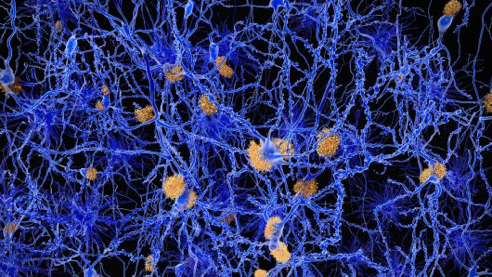Biogen Alzheimer's drug success: A big step because almost every dementia trial before it has ended in failure
-
Biogen announced surprise successful results from an Alzheimer's drug clinical trial that sent shares of the pharmaceutical company soaring.
-
Alzheimer's drug research has been plagued by years of unrelenting failures, leading companies including Pfizer to give up the search for new compounds.
-
Dementia experts have questioned the narrow focus from biotech companies on amyloid protein, but the Biogen progress with an amyloid-targeting drug may lead to renewed confidence in the search for similar drugs.
There's been one glaring absence on the list of pharmaceutical company breakthroughs in recent decades: a drug to treat Alzheimer’s Disease, the most common form of dementia that some experts believe could single-handedly bankrupt Medicare in a matter of decades. As
cancer drugs going through clinical trials have reached a 20 percent success rate, the search for a drug to treat dementia has been one of modern medicine's greatest frustrations: a 99.6 percent failure rate.
That long history of false starts helps to explain why positive clinical trial results for a new Alzheimer’s drug reported on Thursday by
Biogenand Tokyo-based Eisai
sent sent shares of Biogen soaring. The companies reported “statistically significant” evidence that the drug, BAN2401, an antibody targeting the beta amyloid protein, can slow progression of the deadly disease. Investors are predicting the final drug has a 50 percent chance of getting approved, Salim Syed, Mizuho Securities analyst, told CNBC on Friday.
But Biogen officials were more cautious in their optimism, and for good reason. The beta amyloid protein has long been hypothesized as the primary cause of Alzheimer’s, and as a result, the target of a majority of drug trials. But failure has been so relentless that some dementia experts have questioned the drug industry's narrow focus on amyloid. Some focus has shifted to the tau protein. BAN2401 is the first late-stage, anti-amyloid antibody to achieve statistically significant results at 18 months, Biogen reported.Slowing cognitive decline, rather than stopping or reversing it, is still progress“Extremely encouraging” said Biogen chairman Stelios Papadopoulos to CNBC's Closing Bell on Friday. It's the first time a
drug has shown the ability to clear the amyloid plaque, and “more importantly ... that the clearance of plaque was associated with a slowdown of the cognitive decline,” he said. But Papadopoulos said more still needs to be done: “It’s not as if we improved the condition or we stabilized even the cognitive decline. We’ve slowed down the cognitive decline.”
Biogen’s drug trial re-tested at 18 months after it was originally deemed unsuccessful after 12 months. This time, the 856 patients in the trial “demonstrated a statistically significant slowing of disease progression” compared to those taking a placebo. “I’m cautiously optimistic,” The Mayo Clinic’s Ronald Petersen, who directs its Alzheimer’s Disease Research Center, told CNBC's Power Lunch.
The news should provide a much-needed boost to the amyloid hypothesis. Many leading researchers continue to believe that finding a successful Alzheimer's drug is only a matter of time, but they have been calling for a broader search for potential Alzheimer's drug targets. One of them is Jeff Cummings, founding director of the Cleveland
Clinic for Brain Health, who has published
an annual report for years tracking the failure of Alzheimer's drugs and stresses the urgent need for drugs. Cummings has encouraged research beyond the amyloid protein hypothesis. But he issued a positive statement on the Biogen trial. “The 18-month results of the BAN2401 trial are impressive and provide important support for the amyloid hypothesis,” he said.
“At this early stage in drug development, in my view, anything that says the drug is having the intended effect in the brain is a good thing,” Eric Siemers, founding member of the Alzheimer’s Association Research Roundtable, told CNBC on Friday. “It does seem that directionally we’re on the right track. ... we’re headed in the right direction.”
There is still no treatment that can slow the progression of Alzheimer’s, the commonest form of dementia. Current drugs can do no more than ease some of the symptoms. The current $259 billion cost of Alzheimer’s care in the U.S. will reach an “unsupportable” $1 trillion annually by 2050, according to the Alzheimer’s Association.
Syed at Mizuho said more detailed data about the trial is likely to be presented during the Alzheimer’s Association International Conference in late July this year. The Phase III trial for the drug, Biogen’s final trial, will be coming out in late 2019 or early 2020.
Papadopoulos told CNBC the best-case scenario for a treatment available to patients would be two to three years from now. He said it was “way too premature” to speculate on a potential price tag.
Some brain experts say the continued wait for a miracle drug will not help people suffering from the disease today, and that
a focus on lifestyle changes remains the single most-important tool an individual has under their own control to try and slow cognitive decline caused by Alzheimer's.
Source: https://www.cnbc.com/2018/07/06/biogen-alzheimer-drug-success-and-the-long-tail-of-dementia-drug-fails.html
